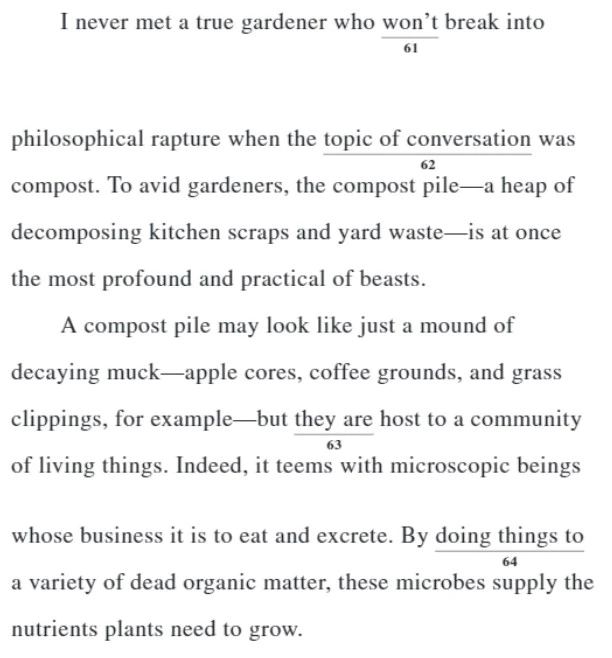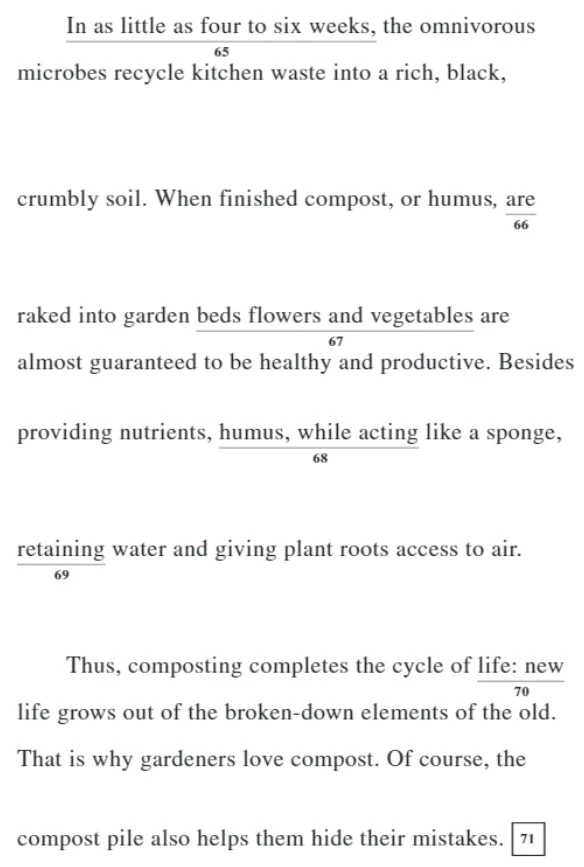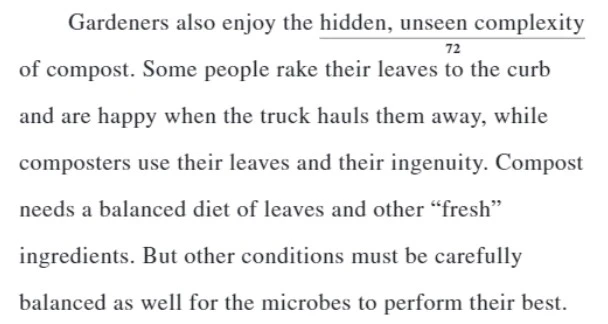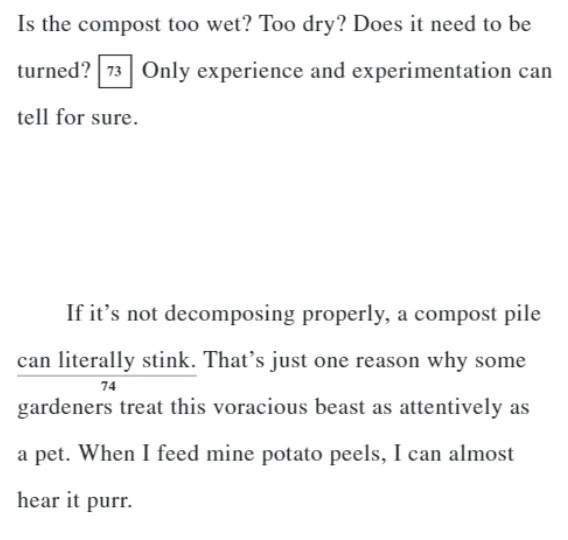Section: English 0 Likes
PASSAGE V - The Compost Pile - I never met a true gardener who won’t (September 2023 - G01)
PASSAGE V
The Compost Pile




Questions from the Passage V
61) A. NO CHANGE B. didn’t C.doesn’t D. will not
62) F. NO CHANGE G. subject of controversy H. reason to be alarmed J. topic of dispute
63) A. NO CHANGE B. their C. it is D. its
64) Which choice best helps the reader conceptualize aspecific process?
F. NO CHANGE
G. digesting
H. modifying
J. altering
65) Which choice provides the most logical transition to this new paragraph?
A. NO CHANGE
B. Meanwhile,
C. Until this happens,
D. On the other hand,
66) F. NO CHANGE G. were H. is J. was
67) A.NO CHANGE B. beds, flowers, and vegetables, C. beds, flowers, and vegetables D. beds, flowers and vegetables
68. F. NO CHANGE G. humus, which acts H. humus, acting J. humus acts
69) A.NO CHANGE B. holding and retaining C. retaining by holding D. retaining which holds
70) Which of the following alternatives to the underlinedportion would NOT be acceptable?
F. life; that is, new
G. life, new
H. life. New
J. life; new
71) The writer is considering adding to the end of the pre-ceding sentence the following statement (deleting theperiod):
— like the vegetable they planted that no one in the family would eat! Should this addition be made here?
A. Yes, because it helps explain what the writermeans by “mistakes.”
B. Yes, because it informs the reader about whichvegetables should not be planted.
C. No, because it contradicts the essay’s assertion that compost guarantees productive vegetable gardens.
D. No, because it fails to maintain the paragraph’s focus on why gardeners love composting.
72) F. NO CHANGE G. hidden complexity H. hidden complexity and intricacy J. hidden, intricate complexity
73) The writer is considering deleting the preceding threequestions from this paragraph. Should the writer deletethese sentences?
A. Yes, because they provide an unnecessary repeti-tion of previously stated ideas.
B. Yes, because they cause a disruption in the flow ofthe paragraph.
C. No, because they clarify what is meant by “conditions.”
D. No, because they support the essay’s focus on theease of composting.
74) Given that all the choices are true, which one mostspecifically describes a particular negative effect ofimproper composting?
F. NO CHANGE
G. can produce problems.
H. creates an unpleasant outcome.
J. doesn’t work very well.
Question 75 asks about the preceding passageas a whole.
75) Suppose the writer’s goal had been to write a personalessay comparing her favorite hobbies. Would this essay fulfill that goal?
A. Yes, because the essay focuses on comparing thenatural processes of the compost pile to that of thecycle of life.
B. Yes, because the essay focuses on describing howcompost piles work, which is an important hobbyto the writer.
C. No, because the focus of the essay is on how othergardeners like composting, not on the writer’s per-sonal feelings about the hobby.
D. No, because although the writer expresses enthusi-asm for composting, the essay does not focus oncomparing this activity to other hobbies.
Solution
Correct answer:
61 - B
62 - F
63 - C
64 - G
65 - A
66 - H
67 - D
68 - J
69 - A
70 - J
71 - A
72 - G
73 - C
74 - F
75 - D
The Importance of Composting
Composting is the process of breaking down organic waste, such as food scraps and yard trimmings, into a rich, dark soil amendment called humus. Humus is a valuable addition to gardens because it improves soil structure, drainage, and fertility. It also helps to retain moisture and release nutrients slowly, making it a great way to feed your plants.
Benefits of Composting
Reduces waste: Composting can divert up to 30% of household waste from landfills, where it decomposes anaerobically and releases methane gas, a potent greenhouse gas.
Improves soil health: Humus improves soil structure, drainage, and fertility, making it a better growing medium for plants.
Conserves water: Humus helps to retain soil moisture, reducing the need for watering.
Reduces reliance on fertilizers: Humus slowly releases nutrients to plants, reducing the need for chemical fertilizers.
Supports healthy ecosystems: Composting helps to cycle nutrients back into the environment, supporting healthy ecosystems.
How to Compost
There are many different ways to compost, but the basic process is the same:
Choose a composting site: Select a well-drained location that receives some shade.
Gather your materials: Collect organic waste such as food scraps, yard trimmings, and coffee grounds.
Create a compost pile: Mix your organic waste with a carbon-rich material such as dried leaves or shredded newspaper.
Maintain the compost pile: Keep the compost pile moist but not soggy, and turn it occasionally to aerate it.
Monitor the compost: The compost is ready to use when it is dark, crumbly, and has an earthy smell.
Composting Tips
Start small: Don't try to compost too much at first. Begin with a small pile and add more materials as you become more comfortable with the process.
Shred your materials: Shredding your organic waste will help it break down faster.
Add a variety of materials: Use a variety of organic materials, including both nitrogen-rich and carbon-rich materials.
Keep the compost pile moist: The compost pile should be moist but not soggy. If it is too dry, add water. If it is too wet, add more carbon-rich materials.
Turn the compost pile regularly: Turning the compost pile will help to aerate it and speed up the decomposition process.
Be patient: Composting takes time. It may take several months or even a year for your compost to be ready to use.
Composting is a great way to reduce waste, improve soil health, and support healthy ecosystems. With a little effort, you can easily compost at home and reap the many benefits of this natural process.
Additional Points
The passage mentions that a compost pile is a "heap of decomposing kitchen scraps and yard waste" ([1]).
It also describes the compost pile as a "community of living things" ([2]).
The passage explains that compost can be used to "fertilize flowers and vegetables" ([5]).
It also mentions that composting can help to "hide gardeners' mistakes" ([6]).
Finally, the passage emphasizes that composting is a "cycle of life" that "completes the cycle of life" ([7]).
Exam Edition: September 2023 - G01
Exam Year: 2023
Related topics: Text interpretation, Reading, Grammar